Compiler Options Mapping
PureBASIC v5.61
This reference page documents how each of the PureBASIC IDE compiler settings for a source file are stored in the file's configuration as preference keys (ie: <KEY> = <VALUE> pairs, or just simple <KEY> entries).
Table of Contents
PureBASIC IDE saves the compiler settings for each source file as <KEY> = <VALUE> pairs, or simple <KEY> entries. Depending on the IDE preferences for "Editor » Save Settings to:", these options will be stored in either:
- The end of the source file — as a comments block.
- __The
<filename>.pb.cfgfile __ — each source file has its own preference file. -
A common file
project.cfgfor every directory — a preference file divided into groups/sections, one for each source file in the folder
For more info, see the Wiki page dedicated to these IDE settings:
Regardless of where the settings are stored, the keys/values used for mapping the IDE source setttings to file are exactly the same.
The Compiler Options dialog can be accessed from PureBASIC IDE's menu "Compiler » Compiler Options...". The dialog has 5 tabs, and we'll examine how the options of each tab are mapped to file settings.
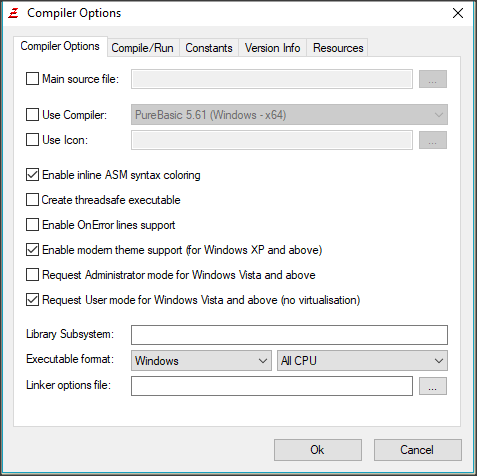
NOTE — The following screenshots and settings refer to non-project files. Project source files will show a slightly different Compiler Options dialog.
For example, the Compiler Options dialog for a project file will show some settings not available for non-project files:
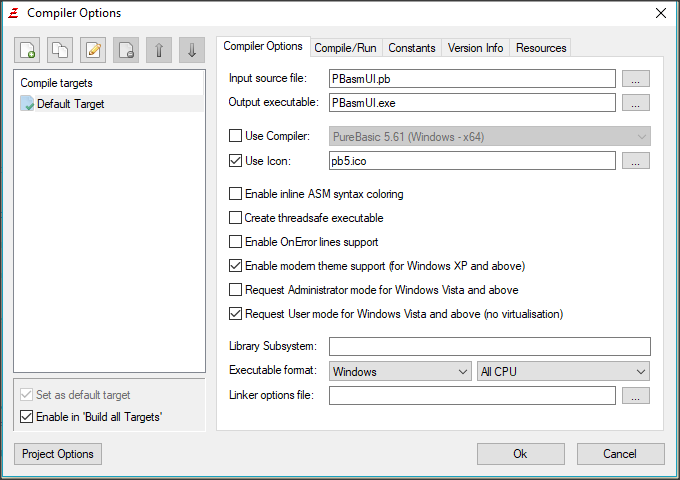
... namely: "Input source file:" and "Output executable:" settings are only available for project files, whereas non-project files will display the "Main source file:" setting instead.
From PureBASIC Documentation:
The right side of the compiler options is almost the same as in the non-project mode and reflects the settings for the compile target that is currently selected on the left. The only difference are the "Input source file" and "Output executable" fields on the first tab. These fields have to be specified for all compile targets. Other than that, the compiler options are identical to the options described above.
In project mode, the information about the compile target is stored in the project file and not in the individual source files. Information that belongs to the file (such as the folding state) are still saved for the individual source files in the location specified by the Preferences.
For more details on the various compiler options, see:
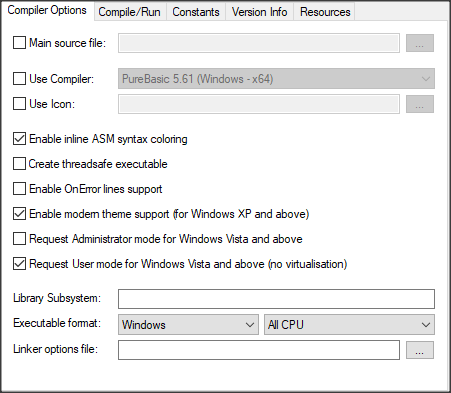
- "Main source file :" »
UseMainFile = <file.pb> - "Use Compiler:" »
Compiler = PureBasic 5.61 (Windows - x86) - "Use Icon:" »
UseIcon = <file.ico> - "Enable inline ASM support :" »
EnableAsm(false if absent) - "Create thread-safe executable:" »
EnableThread(false if absent) - "Enable modern theme support :" »
EnableXP(false if absent) - "Request Administrator mode for Windows Vista and above:" »
EnableAdmin(false if absent) - "Request User mode for Windows Vista and above :" »
EnableUser(false if absent) - "Enable OnError lines support:" »
EnableOnError(false if absent) - "Library Subsystem:" »
SubSystem = SubSys1 SubSys2(one or more subsystem, space separated) - "Executable format:" »
ExecutableFormat = <format>; one of:- "Windows" » absent key (default)
ExecutableFormat - "Console" »
ExecutableFormat = Console - "Shared DLL" »
ExecutableFormat = Shared dll
- "Windows" » absent key (default)
- "Cpu Optimisation:" »
CPU = <num>; one of:- "All CPU:" » absent key (default)
CPU - "Dynamic CPU" »
CPU = 1 - "CPU with MMX" »
CPU = 2 - "CPU with 3DNOW" »
CPU = 3 - "CPU with SSE" »
CPU = 4 - "CPU with SSE2" »
CPU = 5
- "All CPU:" » absent key (default)
- "Linker options file:" »
LinkerOptions = <file>
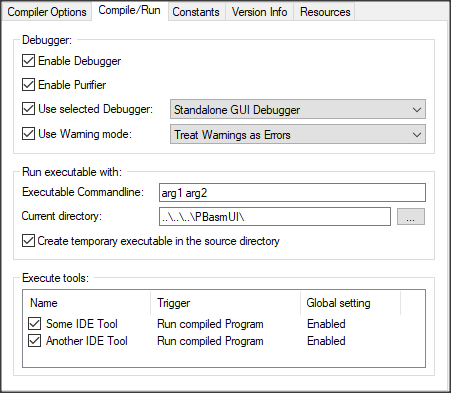
- "Enable Debugger:" » absent key (default) or
DisableDebugger - "Enable Purifier:" »
EnablePurifier(false if absent) - "Use selected Debugger:" »
Debugger = <debugger>; one of:- "Integrated IDE Debugger" »
Debugger = IDE - "Standalone GUI Debugger" »
Debugger = Standalone - "Console only Debugger" »
Debugger = Console
- "Integrated IDE Debugger" »
- "Use Warning mode:" »
Warnings = <mode>; one of:- "Ignore Warnings" »
Warnings = Ignore - "Display Warnings" »
Warnings = Display - "Treat Warnings as Errors" »
Warnings = Error
- "Ignore Warnings" »
- "Executable command-line:" »
CommandLine = <args string>
- "Current directory:" »
CurrentDirectory = ..\some\relative\path\
- "Create temporary executable in the source directory:" »
CompileSourceDirectory - "Execute tools:" »
EnabledTools = <tools list>— where<tools list>is a comma-separated list of external IDE tools identifiers (Eg:EnabledTools = SOME_IDE_TOOL,ANOTHER_IDE_TOOL. Identifiers are generated by PB IDE transforming the tool's name to uppercase, replacing spaces with underscores, and using letters and numbers only (eg: "Some IDE Tool" becomesSOME_IDE_TOOL).
... to be continued ...
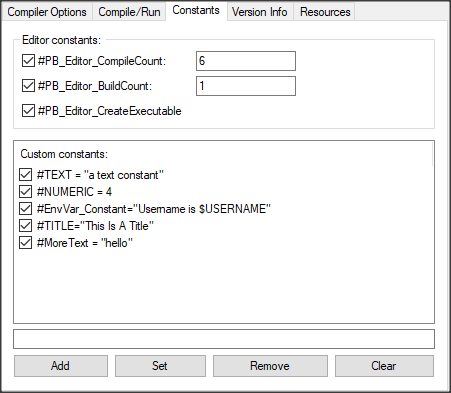
- "#PB_Editor_CompileCount:" »
EnableCompileCount = <number> - "#PB_Editor_BuildCount:" »
EnableBuildCount = <number> - "#PB_Editor_CreateExecutable" »
EnableExeConstant - "Custom constants:" » multiple
Constant = <definition>entries (one for each constant definition)
NOTE — Because "Custom constants:" supports environment variables through Bash-like syntax (eg:
$ENV_VAR), the dollar syntax for string constants can't be used here (eg:#MyStr$ = "text"will not work).
CUSTOM CONSTANTS EXAMPLE
Constant = #TEXT = "a text constant"
Constant = #NUMERIC = 4
Constant = #EnvVar_Constant="Username is $USERNAME"
Constant = #TITLE="This Is A Title"
Constant = #MoreText = "hello"In the #EnvVar_Constant from the above example, $USERNAME in "Username is $USERNAME" will be expanded to a string with the actual value of USERNAME env var because of the Bash-like dollar syntax (eg: "Username is John Doe").
For the sake of clarity, here is a vertically-stretched composite screenshot of the "Version Info" tab in order to show all it's fields at once (in the IDE you'll have to scroll down to see all fields):
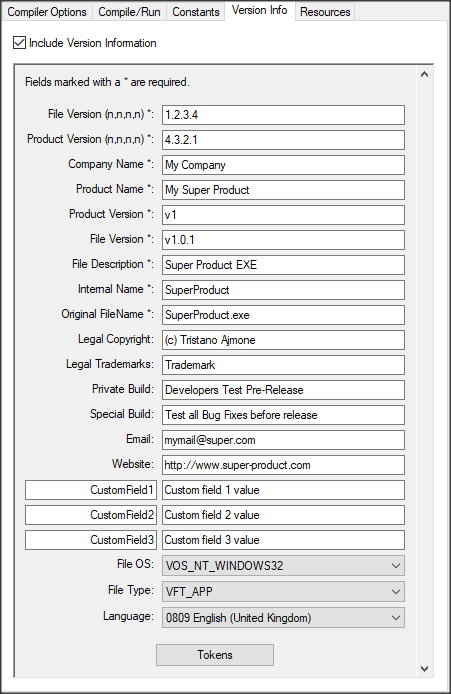
For more information on using Version Information, see the dedicated Wiki page:
The settings of the above IDE screenshot translate to the following settings in the configuration file:
IncludeVersionInfo
VersionField0 = 1.2.3.4
VersionField1 = 4.3.2.1
VersionField2 = My Company
VersionField3 = My Super Product
VersionField4 = v1
VersionField5 = v1.0.1
VersionField6 = Super Product EXE
VersionField7 = SuperProduct
VersionField8 = SuperProduct.exe
VersionField9 = (c) Tristano Ajmone
VersionField10 = Trademark
VersionField11 = Developers Test Pre-Release
VersionField12 = Test all Bug Fixes before release
VersionField13 = mymail@super.com
VersionField14 = http://www.super-product.com
VersionField15 = VOS_NT_WINDOWS32
VersionField16 = VFT_APP
VersionField17 = 0809 English (United Kingdom)
VersionField18 = CustomField1
VersionField19 = CustomField2
VersionField20 = CustomField3
VersionField21 = Custom field 1 value
VersionField22 = Custom field 2 value
VersionField23 = Custom field 3 valueAs the above example shows, all fields are sequentially mapped to VersionField[n], where n is a number ranging from 0 to 23; the fields numbering doesn't always mirror their appearance order in the user interface (only the first 15 do). Unused/empty fields will be omitted from the configuration.
The following table show how the Version fields in the IDE are mapped to saved-settings keys:
| VERSION FIELD | SETTINGS KEY |
|---|---|
| File Version (ח,ח,ח,ח)*: | VersionField0 |
| Product Version (ח,ח,ח,ח)*: | VersionField1 |
| Company Name*: | VersionField2 |
| Product Name*: | VersionField3 |
| Product Version*: | VersionField4 |
| File Version*: | VersionField5 |
| File Description*: | VersionField6 |
| Internal Name*: | VersionField7 |
| Original File Name*: | VersionField8 |
| Legal Copyright: | VersionField9 |
| Legal Trademarks: | VersionField10 |
| Private Build: | VersionField11 |
| Special Build: | VersionField12 |
| Email: | VersionField13 |
| Website: | VersionField14 |
| Custom Field 1 (Key & Val) |
VersionField18 & VersionField21
|
| Custom Field 2 (Key & Val) |
VersionField19 & VersionField22
|
| Custom Field 3 (Key & Val) |
VersionField20 & VersionField23
|
| File OS: | VersionField15 |
| File Type: | VersionField16 |
| Language: | VersionField17 |
... to be continued ...
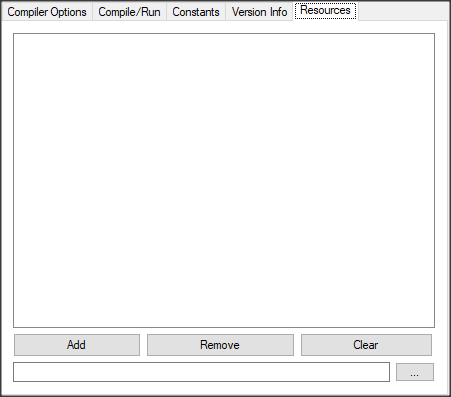
... to be continued ...
PBasmUI was written by Horst Schaeffer: http://horstmuc.de/pb.htm